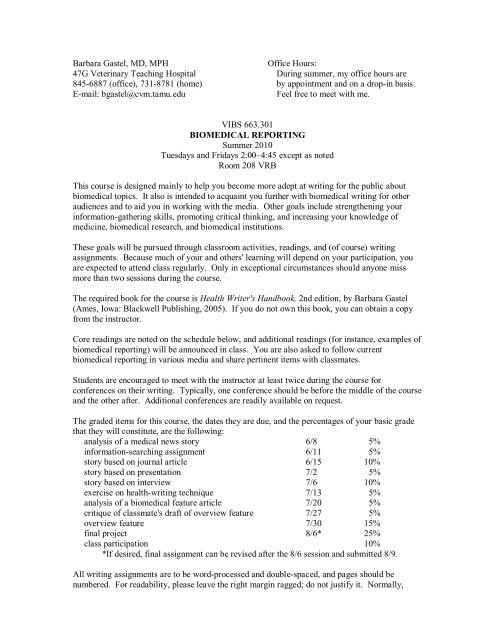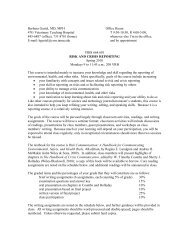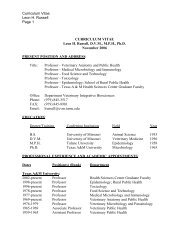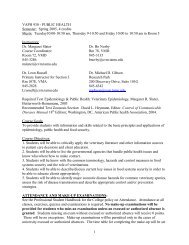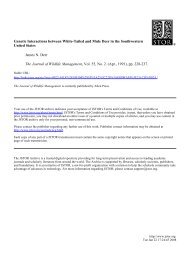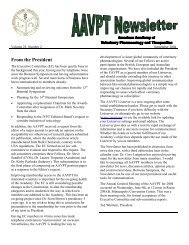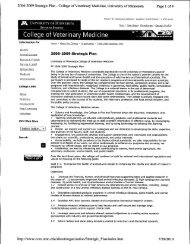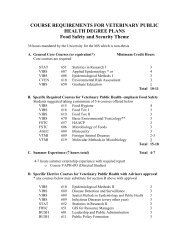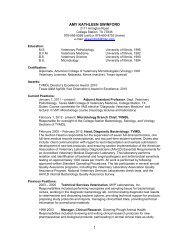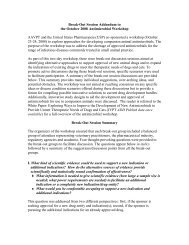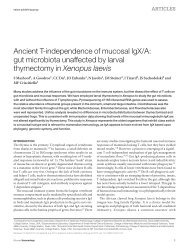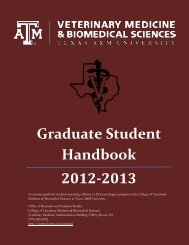Barbara Gastel, MD - College of Veterinary Medicine
Barbara Gastel, MD - College of Veterinary Medicine
Barbara Gastel, MD - College of Veterinary Medicine
Create successful ePaper yourself
Turn your PDF publications into a flip-book with our unique Google optimized e-Paper software.
<strong>Barbara</strong> <strong>Gastel</strong>, <strong>MD</strong>, MPH Office Hours:<br />
47G <strong>Veterinary</strong> Teaching Hospital During summer, my <strong>of</strong>fice hours are<br />
845-6887 (<strong>of</strong>fice), 731-8781 (home) by appointment and on a drop-in basis.<br />
E-mail: bgastel@cvm.tamu.edu Feel free to meet with me.<br />
VIBS 663.301<br />
BIOMEDICAL REPORTING<br />
Summer 2010<br />
Tuesdays and Fridays 2:00–4:45 except as noted<br />
Room 208 VRB<br />
This course is designed mainly to help you become more adept at writing for the public about<br />
biomedical topics. It also is intended to acquaint you further with biomedical writing for other<br />
audiences and to aid you in working with the media. Other goals include strengthening your<br />
information-gathering skills, promoting critical thinking, and increasing your knowledge <strong>of</strong><br />
medicine, biomedical research, and biomedical institutions.<br />
These goals will be pursued through classroom activities, readings, and (<strong>of</strong> course) writing<br />
assignments. Because much <strong>of</strong> your and others' learning will depend on your participation, you<br />
are expected to attend class regularly. Only in exceptional circumstances should anyone miss<br />
more than two sessions during the course.<br />
The required book for the course is Health Writer's Handbook, 2nd edition, by <strong>Barbara</strong> <strong>Gastel</strong><br />
(Ames, Iowa: Blackwell Publishing, 2005). If you do not own this book, you can obtain a copy<br />
from the instructor.<br />
Core readings are noted on the schedule below, and additional readings (for instance, examples <strong>of</strong><br />
biomedical reporting) will be announced in class. You are also asked to follow current<br />
biomedical reporting in various media and share pertinent items with classmates.<br />
Students are encouraged to meet with the instructor at least twice during the course for<br />
conferences on their writing. Typically, one conference should be before the middle <strong>of</strong> the course<br />
and the other after. Additional conferences are readily available on request.<br />
The graded items for this course, the dates they are due, and the percentages <strong>of</strong> your basic grade<br />
that they will constitute, are the following:<br />
analysis <strong>of</strong> a medical news story 6/8 5%<br />
information-searching assignment 6/11 5%<br />
story based on journal article 6/15 10%<br />
story based on presentation 7/2 5%<br />
story based on interview 7/6 10%<br />
exercise on health-writing technique 7/13 5%<br />
analysis <strong>of</strong> a biomedical feature article 7/20 5%<br />
critique <strong>of</strong> classmate's draft <strong>of</strong> overview feature 7/27 5%<br />
overview feature 7/30 15%<br />
final project 8/6* 25%<br />
class participation 10%<br />
*If desired, final assignment can be revised after the 8/6 session and submitted 8/9.<br />
All writing assignments are to be word-processed and double-spaced, and pages should be<br />
numbered. For readability, please leave the right margin ragged; do not justify it. Normally,
assignments should be submitted on time. However, you may submit one assignment (other than<br />
the final paper) one session late without penalty.<br />
Grading will be as follows:<br />
A 90-100 (highly pr<strong>of</strong>essional or otherwise outstanding)<br />
B 80-89 (very good; approaching pr<strong>of</strong>essional quality)<br />
C 70-79 (adequate)<br />
D 60-69 (marginal)<br />
F
consider it in the context <strong>of</strong> material presented in class last week and the<br />
reading for today. Using the examples on pages 127-135 <strong>of</strong> the textbook<br />
as models, write comments about the content and crafting <strong>of</strong> the story in<br />
the column provided for this purpose. On a separate page, supply a brief<br />
(approximately 100- to 200-word) evaluation <strong>of</strong> the story. Be ready to<br />
discuss the story in class.<br />
3 Discussion: Government, Associations, and Other Institutions as Sources<br />
Friday Discussion: Exercises and Writing Assignment Due Today<br />
June 11 In Class-Exercise: Identifying Potentially Newsworthy Sessions at a Medical<br />
Conference<br />
Core Reading Due:<br />
• text: Chapter 3 (“Government, Associations, and Other Institutions”)<br />
• Viswanath, K., et al. Occupational practices and the making <strong>of</strong> health<br />
news: a national survey <strong>of</strong> U.S. health and medical science journalists.<br />
Journal <strong>of</strong> Health Communication 2008;13:759-777.<br />
• Woloshin, Steven, and Schwartz, Lisa M. Media reporting on research<br />
presented at scientific meetings: more caution needed. MJA<br />
2006;184:576-580.<br />
Exercises Due:<br />
Do exercises 1 and 2 on pages 49 and 50. You need not hand in your<br />
answers, but you should be ready to discuss them in class.<br />
Writing Due: information-searching assignment<br />
Instructions for this assignment will be e-mailed to you.<br />
4 Discussion: Researchers, Clinicians, Patients, and Other People as Sources—<br />
Tuesday Advice on Interviewing and Being Interviewed<br />
June 15 Mock Interview(s)<br />
Discussion: Online Resources<br />
Discussion: Exercises Due Today<br />
Workshop: Writing Assignment for Today<br />
Core Reading Due:<br />
• text: Chapter 4 (“Researchers, Clinicians, Patients, and Others”) and<br />
Chapter 5 (“Online Resources”)<br />
• Stamm, Karen, et al. Helping journalists get it right: a physician’s guide<br />
to improving health care reporting. Journal <strong>of</strong> General Internal<br />
<strong>Medicine</strong> 2003;18:138-145.<br />
• How to evaluate health information on the Internet: questions and<br />
answers. National Cancer Institute, reviewed March 2009.<br />
http://www.cancer.gov/cancertopics/factsheet/Information/internet.<br />
• Medical Library Association Consumer and Patient Health Information<br />
Section (CAPHIS). Top 100 List: Health Websites You Can Trust;<br />
updated January 2010. http://caphis.mlanet.org/consumer.<br />
Exercises Due:<br />
Do exercise 1a on page 63, exercise 3 on page 64, and exercises 1-3 on<br />
page 71. You need not hand in your answers, but you should be ready to<br />
discuss them in class.<br />
Writing Due: news story based on a journal article<br />
Find in a medical journal or basic medical science journal a newsworthy<br />
report <strong>of</strong> original research, and write a news story about it. The story<br />
3
should run about 500 words. At the beginning <strong>of</strong> the story, specify the<br />
newspaper or other site for which the story is intended. Attach a copy <strong>of</strong><br />
the journal article.<br />
[Note: Class will not meet during the rest <strong>of</strong> June. Please be working on the reading and writing<br />
for later in the course.]<br />
Unit III: Evaluating Biomedical Information<br />
5 Discussion: Evaluating Medical Information—Some Basics<br />
Friday Discussion: Exercises Due Today<br />
July 2 Exercise: Evaluating Medical Information<br />
Workshop: Writing Assignment for Today<br />
Progress Reports: Writing Assignment Due Next Week<br />
Core Reading Due:<br />
• text: Chapter 6 (“Evaluating Information”)<br />
• Schwitzer, Gary. How do US journalists cover treatments, tests,<br />
products, and procedures? An evaluation <strong>of</strong> 500 stories. PLoS <strong>Medicine</strong><br />
2008;5:e95.<br />
• Fishman, Jessica, Ten Have, Thomas, and Casarett, David. Cancer and<br />
the media: how does the news report on treatment and outcomes?<br />
Archives <strong>of</strong> Internal <strong>Medicine</strong> 2010;170(6): 515-518.<br />
• Goozner, Merrill. Covering cancer. [Commentary.] Archives <strong>of</strong><br />
Internal <strong>Medicine</strong> 2010;170(6):518-520.<br />
Exercises Due:<br />
Do exercises 1 and 4 on pages 96-97. You need not hand in your<br />
answers, but you should be ready to discuss them in class.<br />
Writing Due: news story based on presentation<br />
Attend a presentation on a biomedical topic, or watch one on the Internet.<br />
Then write a news story about it. The story should run about 500 words.<br />
At the beginning <strong>of</strong> the story, specify the venue for which the story is<br />
intended. If you draw on sources other than the presentation, please list<br />
them at the end <strong>of</strong> the story.<br />
6 Discussion: Reading for Today<br />
Tuesday Workshop: Some Stories Dealing with Statistics and Risk<br />
July 6 Workshop: Writing Assignment for Today<br />
Workshop: Some Lighter Biomedical Reading<br />
Core Reading Due:<br />
• Marciel, Kelli K., and Kramer, Barnett S. The logic <strong>of</strong> cancer screening:<br />
the clash <strong>of</strong> medical science and intuition. AMWA [American Medical<br />
Writers Association] Journal 2001;16(4):12-18.<br />
• Dentzer, Susan. Communicating medical news—pitfalls <strong>of</strong> health care<br />
journalism. New England Journal <strong>of</strong> <strong>Medicine</strong> 2009;360:1-3.<br />
Writing Due: story based on interview<br />
Interview a biomedical scientist, health pr<strong>of</strong>essional, biomedical reporter,<br />
or other person involved in medical research, medical care, medical<br />
education, medical communication, or another aspect <strong>of</strong> biomedicine.<br />
4
The interview may focus on the person's work, a biomedical issue, or<br />
another topic <strong>of</strong> biomedical interest. Prepare an article presenting<br />
highlights <strong>of</strong> the interview; the article should run about 500 to 1000<br />
words. At the beginning <strong>of</strong> the story, indicate the site for which the story<br />
is intended. At the end, list all sources used.<br />
7 Discussion: Exercises Due Today<br />
Friday Discussion: Understanding and Presenting Risk<br />
July 9 Discussion: Recognizing and Avoiding Statistical Errors<br />
Introduction: Health-Writing Style and Genres<br />
Core Reading Due:<br />
• text: Chapter 14 ("Presenting Risk")<br />
• Lang, Tom. Common statistical errors even you can find. (Three<br />
articles.) AMWA Journal 2003, 2004.<br />
Exercises Due:<br />
Do the exercises on page 288. You need not hand in your answers, but<br />
you should be ready to discuss them in class.<br />
Unit IV: Health-Writing Style and Genres<br />
8 Discussion: Exercises Due Today<br />
Tuesday Discussion: Health-Writing Style<br />
July 13 Discussion: Some Health-Related Feature Articles<br />
Core Reading Due:<br />
• text: Chapter 7 (review it), pp. 138-143 (“The Feature Article Family”),<br />
and Chapter 10 (“Sensitivity and Style”)<br />
• some examples <strong>of</strong> feature articles<br />
Exercises Due:<br />
Do exercise 2 on page 145 for articles 8-1 and 8-2, and do exercises 1<br />
and 2 on pages 200-201. You need not hand in your answers, but you<br />
should be ready to discuss them in class.<br />
Writing Due: exercise on health-writing technique<br />
Do either exercise 1 on page 115 or exercise 3 on page 116. This<br />
exercise will be graded.<br />
9 Attendance <strong>of</strong> Open Session on Biomedical Writing<br />
Friday Speaker: Tom Lang<br />
July 16 Tom Lang Communications<br />
http://www.tomlangcommunications.com<br />
Other Items to Be Announced<br />
10 Discussion: Investigative Reporting on <strong>Medicine</strong> and Health<br />
Tuesday Discussion: Biomedical Essays, Columns, and Book Reviews<br />
July 20 Progress Reports: Overview Features<br />
Core Reading Due:<br />
• text: pp. 126, 136-138 (“Investigative and Depth Reporting”), p. 143<br />
("Other Article Genres"), pp. 143-145 ("Books")<br />
• Kiernan, Stephen. Breaking the medical malpractice code <strong>of</strong> secrecy.<br />
Nieman Reports, Summer 2003, pp. 8-11.<br />
• Lieberman, Paul. Investigating what goes wrong in medicine. Nieman<br />
5
Reports, Summer 2003, pp. 16-18.<br />
• Hilts, Philip J. Digging beneath what is said to be the truth. Nieman<br />
Reports, Summer 2003, pp. 32-34.<br />
• Goldberg, Paul. Acting as a watchdog on cancer research. Nieman<br />
Reports, Summer 2003, pp. 35-36.<br />
• some investigative stories on medical topics<br />
• some biomedical essays, columns, and book reviews<br />
Exercises Due:<br />
Do exercise 2 on page 145 for articles 8-3 and 8-4.<br />
Writing Due: analysis <strong>of</strong> a biomedical feature article<br />
Identify a biomedical feature article that you consider <strong>of</strong> generally high<br />
quality. The article may be in any medium. In up to 500 words, identify<br />
the main strengths <strong>of</strong> the story; include examples to illustrate your points.<br />
If appropriate, also identify limitations <strong>of</strong> the article. Accompany your<br />
analysis with a copy <strong>of</strong> the article.<br />
11 Discussion: Biomedical Reporting in the Broadcast Media<br />
Friday Discussion: Biomedical Reporting on the World Wide Web<br />
July 23 Viewing and Discussion: An Award-Winning Biomedical Documentary<br />
Core Reading Due:<br />
• text: Chapter 9 ("Medical Reporting for the Electronic Media" by Tom<br />
Linden)<br />
• Tanner, Andrea H. Agenda-building, source selection and health news at<br />
local television stations: a nationwide survey <strong>of</strong> local television health<br />
reporters. Science Communication 2004;25(4): 350-363.<br />
• Pribble, James M., et al. Medical news for the public to use? What’s on<br />
local TV news. American Journal <strong>of</strong> Managed Care 2006;12:170-176.<br />
• Lieberman, Trudy. The epidemic. Columbia Journalism Review, March-<br />
March 2007.<br />
• Krulwich, Robert. Sticky storytelling. In: Winburn, Jan, editor. Shop<br />
Talk and War Stories: American Journalists Examine Their Pr<strong>of</strong>ession.<br />
Boston: Bedford/St. Martin’s, 2003.<br />
Writing Due: draft <strong>of</strong> overview feature<br />
Draft a feature article providing an overview <strong>of</strong> a biomedical topic. The<br />
article should run about 1000 to 1500 words (about four to six doublespaced<br />
pages). At the beginning, specify the site for which the feature is<br />
intended, and note the word count. At the end, list sources used. Please<br />
submit your draft in duplicate, so a classmate can prepare a constructive<br />
critique <strong>of</strong> it as the next assignment. (Note: This draft will not be graded,<br />
but it is required. Failure to submit it will result in subtraction <strong>of</strong> 10<br />
points from the grade on the final version <strong>of</strong> the article.)<br />
12 Discussion: Award Winners and Awards<br />
Tuesday Discussion: Class Members' Plans for and Progress on Final Project<br />
July 27 Workshop: Drafts <strong>of</strong> Overview Feature<br />
Core Reading Due:<br />
• text: Chapter 11 ("Award Winners and Awards")<br />
• selected other award-winning work<br />
Exercises Due:<br />
Do the exercises on page 219. (For exercise 2, you may substitute an<br />
6
more recent item analogous to those in the table.) You need not hand in<br />
your answers, but you should be ready to discuss them in class.<br />
Writing Due: constructive critique <strong>of</strong> classmate's draft<br />
Prepare a constructive critique <strong>of</strong> the draft <strong>of</strong> a classmate's feature article.<br />
The critique should both note strengths and suggest improvements.<br />
Please submit<br />
• a copy <strong>of</strong> the draft with editing on it<br />
• a memo presenting comments and suggestions to the author<br />
Please provide these materials in duplicate.<br />
Unit V: Some Key Issues and Areas<br />
13 Discussion: Some Ethical and Legal Issues in Biomedical Reporting<br />
Friday Discussion: Covering Ethical Issues<br />
July 30 Progress Reports: Final Project<br />
Discussion: Covering Key Realms<br />
Core Reading Due:<br />
• text: Chapters 12 (“Ethical and Legal Issues”) and 13 ("Covering Key<br />
Realms")<br />
• Schwitzer, Gary. A statement <strong>of</strong> principles for health care journalists.<br />
American Journal <strong>of</strong> Bioethics 2004;4:W9-W13.<br />
• Moynihan, Roy. Tipsheet for reporting on drugs, devices and medical<br />
technologies.<br />
• Lieberman, Trudy. Covering medical technology: the seven deadly sins.<br />
Columbia Journalism Review, September/October 2001, pp. 24-28.<br />
• Laidman, Jenni. The emotional toll <strong>of</strong> reporting on a cancer trial.<br />
Nieman Reports, Summer 2003, pp. 36-40.<br />
• selected items from the Association <strong>of</strong> Health Care Journalists website<br />
(http://www.healthjournalism.org/)<br />
Exercises Due:<br />
Do the exercises on pages 265-266 and on page 280. You need not hand<br />
in your answers, but you should be ready to discuss them in class.<br />
Writing Due: overview feature<br />
(See instructions above.)<br />
[Note: Class will not meet on Tuesday, August 3.]<br />
Unit VI: Concluding Items<br />
14 Discussion: Careers, Pr<strong>of</strong>essional Organizations, and Educational Opportunities<br />
Friday Workshop: Final Project<br />
August 6 Wrap-Up<br />
Core Reading Due:<br />
• text: Chapters 15 (“Career Options”), 16 (“Pr<strong>of</strong>essional Organizations”),<br />
and 17 (“Educational Opportunities”)<br />
• Sugg, Diana K. Conquering the beat (instead <strong>of</strong> letting it rule you). In:<br />
Winburn, Jan, editor. Shop Talk and War Stories: American Journalists<br />
Examine Their Pr<strong>of</strong>ession. Boston: Bedford/ St. Martin’s, 2003.<br />
Exercises Due:<br />
Do exercise 1 on page 303, exercise 3 on page 304, exercises 1-3 on<br />
7
pages 311-312, and exercise 3 on page 324. You need not hand in your<br />
answers, but you should be ready to discuss them in class.<br />
Writing Due: final project<br />
Please do one <strong>of</strong> the following:<br />
(1) Write a feature story on a biomedical topic. The story may be for any<br />
medium; it should draw on a range <strong>of</strong> sources and run about 2000 words.<br />
At the beginning <strong>of</strong> the story, specify the site for which it is intended and<br />
the word count. At the end, list the sources used. If appropriate, supply<br />
illustrations or ideas for illustrations.<br />
(2) Write a paper on an aspect <strong>of</strong> biomedical reporting <strong>of</strong> pr<strong>of</strong>essional<br />
interest to you. The paper should be intended for your classmates in this<br />
course and should run about 2000 words; it should be informative and<br />
readable. At the beginning <strong>of</strong> the paper, list the word count. At the end,<br />
list the sources used.<br />
Note: If desired, the final assignment can be revised after this session and<br />
submitted on Monday, August 9.<br />
The Americans with Disabilities Act (ADA) is a federal anti-discrimination statute that provides<br />
comprehensive civil rights protection for persons with disabilities. Among other things, this<br />
legislation requires that all students with disabilities be guaranteed a learning environment that<br />
provides for reasonable accommodation <strong>of</strong> their disabilities. If you believe you have a disability<br />
requiring an accommodation, please contact the Office <strong>of</strong> Disability Services in Cain Hall, Room<br />
B118, or call 845-1637.<br />
As the Aggie Honor Code states, “An Aggie does not lie, cheat, or steal or tolerate those who<br />
do.” It is expected that you will neither give nor receive unauthorized aid on work in this course.<br />
All writing for this course must be your original work. For Texas A&M Honor Council Rules<br />
and Procedures, please see www.tamu.edu/aggiehonor.<br />
8


